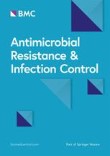
Editor's Note Reducing the number of OR personnel during preparation of sterile surgical goods significantly lowers airborne bacterial contamination, according to a randomized controlled trial published June 15 in Antimicrobial Resistance & Infection Control. The study measured contamination levels during sterile setup for 69 open-heart surgeries, comparing rooms with two…

Editor's Note A 13-year study at US Veterans Affairs (VA) medical centers found a decline in both hospital-associated infections (HAIs) and antimicrobial resistance for common pathogens, MedPage Today August 15 reports. From 2007 to 2019, the overall infection rate of nine pathogens decreased, with an average annual percentage change (AAPC)…

Over 20 years ago, an article from Johns Hopkins published in The New England Journal of Medicine showed that Staphylococcus aureus decolonization of the nares can decrease risk of surgical site infections (SSI). Since then, nasal decolonization—the application of a topical antimicrobial or antiseptic agent to the nares—has been adopted…
Editor's Note This expert guidance document, sponsored by the Society for Healthcare Epidemiology of America (SHEA), updates the “Strategies to Prevent Methicillin-Resistant Staphylococcus aureus [MRSA] Transmission and Infection in Acute Care Hospitals” that were published in 2014. Among the updates: Recommendations are now categorized as Essential Practices that should be…